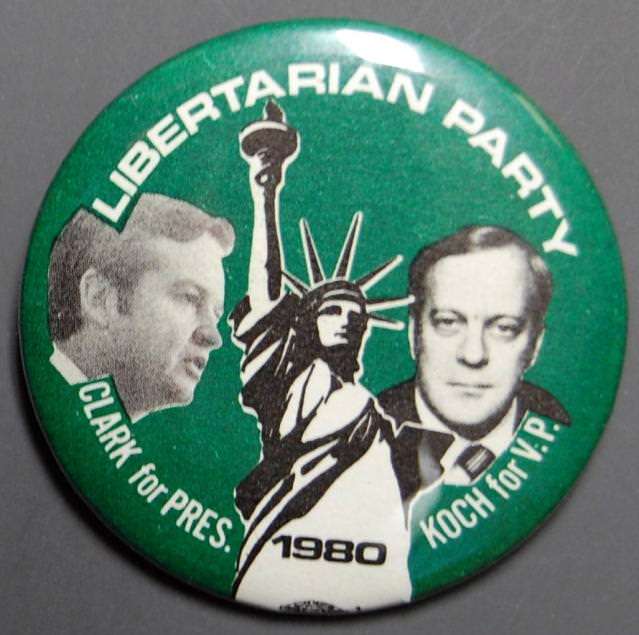Are the Koch Brothers Right-Wingers or Hippies?
It depends on which parts of the Libertarian Party's 1980 platform you emphasize.

In a New York Times review of New Yorker staff writer Jane Mayer's new book about the Koch brothers, CUNY historian David Nasaw notes that David Koch (a trustee of the Reason Foundation, which publishes Reason.com and Reason magazine) was the Libertarian Party's vice presidential nominee in 1980. Nasaw sums up the party's platform this way:
The Libertarians opposed federal income and capital gains taxes. They called for the repeal of campaign finance laws; they favored the abolition of Medicaid and Medicare and advocated the abolition of Social Security and the elimination of the Federal Election Commission, the Securities and Exchange Commission, the Environmental Protection Agency, the Food and Drug Administration and the Occupational Safety and Health Administration. "The platform was, in short," Ms. Mayer concludes, "an effort to repeal virtually every major political reform passed during the 20th century."
There is nothing in this gloss to contradict or complicate Mayer's description of the Kochs (in the subtitle of her book) as part of "the Radical Right." Apparently they are conservative Republicans, only worse. Like other people who fear and/or loathe the Kochs (including Bernie Sanders), Nasaw simply ignores the inconvenient parts of the Libertarian Party's 1980 platform. Here are some of the planks he does not see fit to mention:
1. "the repeal of all laws prohibiting the production, sale, possession, or use of drugs";
2. "the repeal of all laws regarding consensual sexual relations, including prostitution and solicitation, and the cessation of state oppression and harassment of homosexual men and women";
3. "the repeal of all laws interfering with the right to commit suicide";
4. support for "the right of individuals to contract freely with practitioners of their choice, whether licensed by the government or not, for all health services," including abortion;
5. opposition to "preventive detention, so-called 'no-knock laws,' and all other measures which threaten individual rights";
6. "the repeal of all laws permitting involuntary psychiatric treatment";
7. opposition to "all forms of government censorship, including anti-pornography laws" and restrictions on broadcast "indecency";
8. opposition to "government harassment or obstruction of unconventional religious groups";
9. opposition to government perusal of private records held by third parties without (and maybe even with) a warrant;
10. "abolition of the Central Intelligence Agency and the Federal Bureau of Investigation";
11. abolition of draft registration;
12. "the elimination of all restriction on immigration";
13. support for dramatic cuts to military spending and the withdrawal of American troops from foreign countries;
14. opposition to wars that are not authorized by Congress; and
15. support for "the principle of non-intervention," which entails "abstaining totally from foreign quarrels and imperialist adventures" while "recognizing the right to unrestricted trade, travel, and immigration."
A lot of this indeed radical, but it is not exactly right-wing, is it? In fact, many people on the left would be comfortable with most or even all of these planks, while self-identified progressives (perhaps including Mayer and Nasaw) would at least be sympathetic to the impulses behind them. But if you emphasize (or even note in passing) that David Koch ran for vice president on a platform that called for the legalization of drugs and prostitution, supported abortion rights, opposed legal discrimination based on sexual orientation, demanded big cuts to the defense budget and a less interventionist foreign policy, opposed all forms of censorship, defended the rights of the accused, decried crackdowns on unauthorized immigrants, and condemned invasions of privacy by law enforcement and intelligence agencies, you make him sound like some sort of hippie, as opposed to a crazy right-winger. More to the point, you make it much harder to demonize him and his brother among people who read The New York Times and The New Yorker.


Show Comments (41)